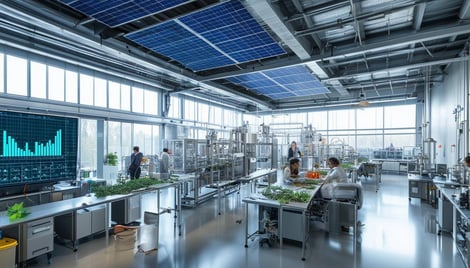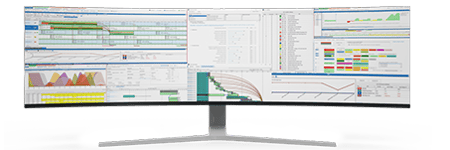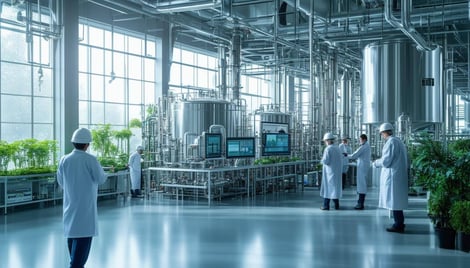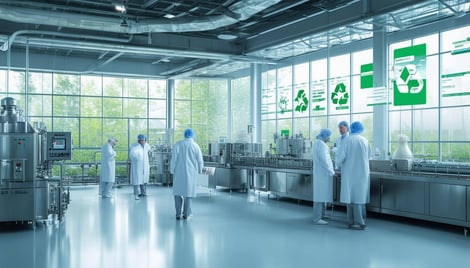Growing Need for Sustainable Manufacturing in Pharmaceutical Facilities
Sustainability in manufacturing is no longer just a buzzword; it’s a strategic imperative, especially for pharmaceutical manufacturing facilities. For Operations Directors, the push towards sustainable practices isn’t just about regulatory compliance – it’s about reducing costs, improving efficiencies, and driving long-term value. With increasing pressure from regulators, consumers, and stakeholders, sustainable manufacturing is becoming central to growth strategies in the pharmaceutical sector.
In this blog, we will explore why sustainable manufacturing is critical, the unique challenges pharmaceutical manufacturers face, and how tools like PlanetTogether integrated with ERP systems such as SAP, Oracle, Microsoft, Kinaxis, or Aveva can help achieve sustainability goals while maintaining operational excellence.

Why is Sustainability Important in Pharmaceutical Manufacturing?
Pharmaceutical manufacturing is resource-intensive. Processes often consume vast amounts of energy, water, and raw materials while generating significant waste. Consider these global trends influencing the sector:
Regulatory Demands: Organizations like the FDA and EMA are placing stricter requirements on sustainability and environmental impacts, ensuring that pharmaceutical products meet ethical and regulatory standards.
Rising Energy Costs: Energy-intensive production processes, such as active pharmaceutical ingredient (API) synthesis, are becoming increasingly costly.
Consumer and Investor Pressure: More consumers prefer to purchase products from brands with environmentally responsible practices. Similarly, investors are favoring companies with clear sustainability roadmaps.
Supply Chain Disruptions: Sustainable practices, such as circular supply chains, can minimize waste and optimize resource usage, helping mitigate disruptions.
For Operations Directors, these challenges present opportunities to improve processes, lower costs, and establish a leadership position in sustainable manufacturing.

Key Challenges in Achieving Sustainability
Despite its benefits, implementing sustainable practices in pharmaceutical manufacturing is not without hurdles:
High Energy Consumption: Pharmaceutical manufacturing requires precise environmental controls and complex production equipment, leading to significant energy usage.
Waste Management: Handling hazardous waste and ensuring regulatory compliance can be both complex and costly.
Resource Utilization: Water usage in cleaning, cooling, and production processes is immense, requiring innovative conservation strategies.
Legacy Systems: Older manufacturing systems and processes may not be flexible enough to adopt sustainable practices.
Balancing Efficiency and Compliance: Sustainability efforts must not compromise product quality or timelines.
However, modern technologies, such as advanced planning and scheduling systems, can help pharmaceutical facilities navigate these challenges effectively.
![]()

Leveraging PlanetTogether for Sustainable Manufacturing
PlanetTogether, when integrated with leading ERP systems such as SAP, Oracle, Microsoft, Kinaxis, or Aveva, provides pharmaceutical manufacturers with powerful tools to address sustainability goals while maintaining operational efficiency.
Here’s how:
1. Energy and Resource Optimization
PlanetTogether’s advanced scheduling capabilities enable pharmaceutical facilities to optimize production plans based on energy consumption and resource availability. For instance:
Batch Consolidation: By consolidating production batches, manufacturers can reduce energy-intensive clean-in-place (CIP) processes and equipment downtime.
Energy-Efficient Scheduling: Integrating PlanetTogether with SAP or Oracle ERP allows energy usage data to inform production schedules, enabling energy-intensive processes to run during off-peak hours to lower costs and emissions.
Resource Management: Tools like PlanetTogether can align production schedules with resource constraints to minimize water and raw material waste.
By reducing resource consumption, pharmaceutical manufacturers achieve both cost savings and environmental benefits.
2. Waste Reduction and Circular Practices
Pharmaceutical production generates large volumes of waste, but PlanetTogether’s planning and scheduling tools can support waste minimization initiatives. Key strategies include:
Minimized Downtime: Streamlining production schedules reduces start-up waste and raw material usage.
Circular Supply Chains: Integration with Kinaxis or Aveva supply chain platforms can help identify opportunities for recycling materials or reusing components.
Real-Time Monitoring: PlanetTogether, when connected to ERP systems, enables real-time waste tracking, allowing quick adjustments to production processes to reduce scrap and improve yield.
3. Improved Visibility and Data-Driven Decisions
Sustainability in manufacturing requires real-time visibility into operations. PlanetTogether, integrated with SAP or Microsoft Dynamics, provides comprehensive insights into energy usage, resource consumption, and production performance. These insights help:
Identify Inefficiencies: Detect energy or resource bottlenecks and take corrective actions.
Monitor KPIs: Track sustainability metrics, such as energy per batch or water consumption per unit, to ensure targets are met.
Make Proactive Adjustments: Real-time analytics allow Operations Directors to make informed decisions that align production schedules with sustainability goals.
With accurate data, Operations Directors can align operational strategies with environmental initiatives.
4. Enhanced Collaboration Across the Value Chain
Sustainability efforts often extend beyond the production floor. By integrating PlanetTogether with Kinaxis or Aveva supply chain systems, pharmaceutical manufacturers can collaborate more effectively with suppliers, logistics providers, and partners to:
Reduce transportation emissions by optimizing delivery schedules and load capacity.
Share sustainability data with suppliers to align procurement practices with environmental goals.
Improve end-to-end visibility of the supply chain to identify sustainability improvement opportunities.
This level of collaboration ensures that sustainability is embedded across the value chain, not just within the production facility.

A Future-Ready Approach to Sustainable Manufacturing
For Operations Directors in pharmaceutical manufacturing, the journey toward sustainability is both a challenge and an opportunity. By integrating advanced planning and scheduling tools like PlanetTogether with ERP systems such as SAP, Oracle, Microsoft, Kinaxis, or Aveva, manufacturers can:
Reduce energy and resource consumption.
Minimize waste and improve circularity.
Achieve greater operational visibility.
Drive collaboration across the value chain.
These tools not only enable manufacturers to meet growing sustainability requirements but also deliver tangible operational benefits.
In an era where environmental responsibility and operational efficiency are interconnected, embracing sustainable manufacturing practices can position pharmaceutical manufacturers for long-term success.
Sustainability isn’t just about reducing environmental impact – it’s about creating value through smarter operations. Tools like PlanetTogether, integrated with leading ERP systems, empower Operations Directors to make data-driven decisions that align with both business objectives and sustainability goals.
By prioritizing sustainable manufacturing, pharmaceutical facilities can not only stay ahead of regulatory demands but also reduce costs, enhance efficiency, and build a resilient future.
Are you ready to take your manufacturing operations to the next level? Contact us today to learn more about how PlanetTogether and integrated scheduling solutions can help you achieve your sustainability goals and drive success in the pharmaceutical industry.
Topics: PlanetTogether Software, Integrating PlanetTogether, Pharmaceutical Manufacturing, Waste Reduction and Circular Practices, Improved Visibility and Data-Driven Decisions, Energy and Resource Optimization, Enhanced Collaboration Across the Value Chain





















LEAVE A COMMENT